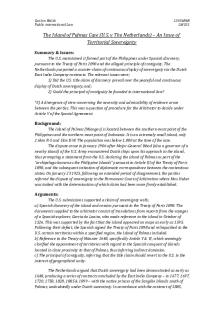Nuclear Test Cases - Public International Law case summaries PDF

| Title | Nuclear Test Cases - Public International Law case summaries |
|---|---|
| Author | Caolan Walsh |
| Course | International Human Rights |
| Institution | National University of Ireland Galway |
| Pages | 1 |
| File Size | 39.9 KB |
| File Type | |
| Total Downloads | 91 |
| Total Views | 136 |
Summary
Public International Law case summaries...
Description
Nuclear Test Cases (New Zealand; Australia v France, 1974) Summary & Issues: Following a series of tests conducted by France in the South Pacific, both New Zealand & Australia asserted separate claims regarding nuclear fall-out that had been detected on their respective territories. Although France contended that the measure of nuclear fall-out was not enough to cause a public health concern, a series of statements from the French government implied that no further testing would occur, despite several subsequent tests taking place. The issues presented in these cases were: - Can public statements made on behalf of the state have a legal effect, even when made prior and/or subsequent to proceedings? - To what extent do such unilateral declarations have binding legal status under international law, especially when made outside the court and erga omnes? - What is the nature & scope of unilateral declarations as sources of international law? Background: The French nuclear testing program began during 1966 at the establishment of the centre d’expérimentations du Pacifique. Although the Nuclear Test Ban treaty had been in force since 1963, Frsnce was not a party to the treaty. Over an extended period of time, several tests were carried out underground and in the atmosphere. A number of cases documented by the International Physicians for the Prevention of Nuclear War (IPPNW) reported nuclear fall-out on territories located in the South Pacific. New Zealand & Australia were among these territories. The court was tasked with establishing the existence of the dispute. Arguments: New Zealand & Australia brought, as the object of the claim, accusations against France regarding the illegality of the atmospheric nuclear tests under international law. After invoking “inherent jurisdiction” and establishing the existence of a dispute, the Court deemed identifying the object of the claim necessary to fulfill its judicial function. The Court redefined the object of New Zealand & Australia’s claim through analysis of a series of public statements made on behalf of the French government that guaranteed no further tests would occur, which were made prior and subsequent to proceedings. The response from the applicants allowed the Court to identify the object of the claim as a clear assurance of the prevention of further tests, rather than a “declaratory judgment”. Judgment: The Court found that unilateral declarations made by French authorities on the matter served to create legal obligations. The principle of good faith attributes unilateral declarations with binding legal character, in the same way pacta sunt servanda accomplishes the compliance with international treaties. As a result the object of the claim is moot, therefore there is nothing upon which to give further judgment....
Similar Free PDFs

Public Law Cases - Privileges
- 4 Pages

Public International Law Notes
- 19 Pages

Public International law Exam
- 18 Pages

Public International Law
- 148 Pages

Case Law - Case law summaries
- 71 Pages

Public International Law Notes
- 37 Pages

Public International Law
- 34 Pages

Public International Law Digests
- 48 Pages

SO Public international Law
- 10 Pages

Public International Law
- 3 Pages

Public International Law Essay
- 6 Pages

Public international law notes
- 51 Pages

Case Law - Case Summaries
- 33 Pages

Public International Law
- 59 Pages
Popular Institutions
- Tinajero National High School - Annex
- Politeknik Caltex Riau
- Yokohama City University
- SGT University
- University of Al-Qadisiyah
- Divine Word College of Vigan
- Techniek College Rotterdam
- Universidade de Santiago
- Universiti Teknologi MARA Cawangan Johor Kampus Pasir Gudang
- Poltekkes Kemenkes Yogyakarta
- Baguio City National High School
- Colegio san marcos
- preparatoria uno
- Centro de Bachillerato Tecnológico Industrial y de Servicios No. 107
- Dalian Maritime University
- Quang Trung Secondary School
- Colegio Tecnológico en Informática
- Corporación Regional de Educación Superior
- Grupo CEDVA
- Dar Al Uloom University
- Centro de Estudios Preuniversitarios de la Universidad Nacional de Ingeniería
- 上智大学
- Aakash International School, Nuna Majara
- San Felipe Neri Catholic School
- Kang Chiao International School - New Taipei City
- Misamis Occidental National High School
- Institución Educativa Escuela Normal Juan Ladrilleros
- Kolehiyo ng Pantukan
- Batanes State College
- Instituto Continental
- Sekolah Menengah Kejuruan Kesehatan Kaltara (Tarakan)
- Colegio de La Inmaculada Concepcion - Cebu

